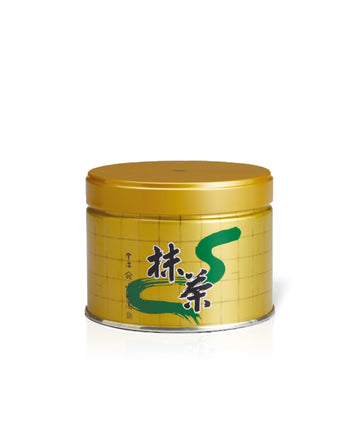Kasuga-No-Mukashi
-
Express tracked delivery:Oct 21 - Oct 25
-
Free Shipping & Returns: On all orders over
CHF 500 ($650/£470)
Kasuga-No-Mukashi
Koicha (thick tea) grade Uji matcha.
Origin: Kyoto Prefecture, Japan
When prepared as a thick tea (koicha), this matcha exhibits an initial intense creaminess coupled with a uniquely pleasant mildness. These qualities swiftly evolve into a powerful, majestic, and full-bodied sensation that lingers delightfully on the palate. Additionally, it offers an exceptional and distinctive flavour profile when brewed as a thin tea (usucha). Compared to the previously mentioned Chajyu-no-Mukashi, it is less mild and sweet, yet it remains considerably more so than the subsequent Kaguraden.
The significance of the name Kasuga no Mukashi "香寿賀の昔" is as follows: "Ka" (香) primarily relates to fragrance, while the latter two characters ("寿賀", pronounced "juga") signify the celebration of longevity.
Regarding the general usage of the terms "mukashi" and "shiro": these expressions, appended to tea names, carry grading implications and serve to differentiate between thick and thin teas, respectively. Historically, only "Mukashi" was likely employed initially, with "Shiro" emerging later.
The term "Mukashi" is believed to combine the Chinese characters for "twenty" (廿) and "day" (日), referencing March 20th (廿日) in the lunar calendar, traditionally regarded as the optimal day for harvesting the finest tea.
Conversely, "Shiro" gained popularity during the era of the third shogun, Tokugawa Iemitsu. It is said to have originated when feudal lords requested Uji tea masters to prepare their tea in a "thin" or "light" manner. Although the precise meaning of "shiro" at that time remains unclear, it is generally thought to denote variations in taste, supported by historical records indicating that Furuta Oribe preferred dark green tea, whereas Kobori Enshu favoured a lighter brew. This distinction between 'dark' and 'light' tea may also be attributed to differing preparation methods practiced in Uji.
While alternative theories regarding the origins of "mukashi" and "shiro" exist, it is reasonable to assert that "mukashi" has been in use since ancient times, with "shiro" becoming prevalent from the Edo period onward. Subsequent generations of tea masters replaced the traditional term "mukashi" with "shiro," both of which had historically described tea grades, thereby standardizing its usage.
In conclusion, although the precise impact of historical developments in the tea ceremony on the meanings of "shiro" and "mukashi" remains somewhat ambiguous, these terms undeniably reflect the evolving trends and transformations of their respective eras and continue to be employed in contemporary tea culture.
“All items are sold in their original packaging from the manufacturer. Sealed and unopened.”



